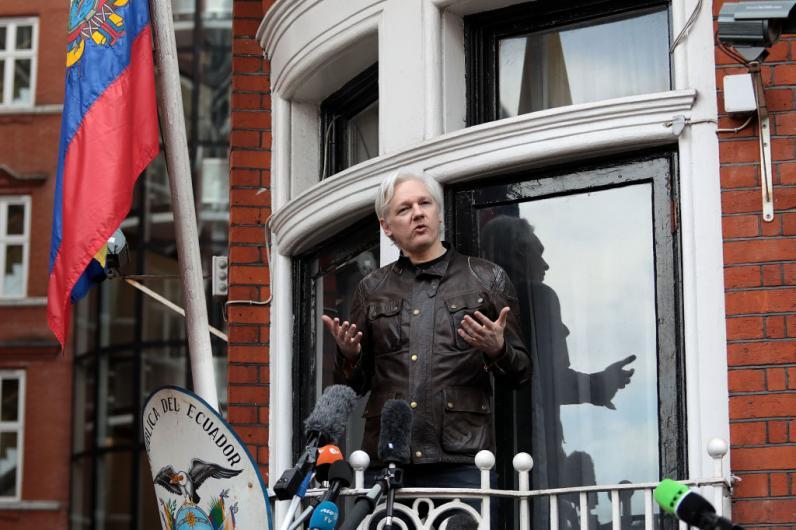Sweden abandoned the persecution of Julian Assange: a trap for the founder of WikiLeaks

Julian Assange speaks from the balcony of the Ecuadorian Embassy in London on May 19, 2017. Photo: Jack Taylor / Getty Images
The founder of WikiLeaks, Julian Assange, has been living in the Ecuadorian embassy in London since 2012. He could not leave the building, because the British police would immediately arrest him at the exit from the steps of the embassy - and start the process of extradition to Sweden, where a criminal case was brought against him for rape. And from there Julian was waiting for a direct road to the United States, where he would face the death penalty on a potential charge of publishing documents that are state secrets (it’s not possible to impute a citizen of Australia to the treason). Officially, the charge in the US has not yet been filed, but no one doubts that the Americans will immediately present it and demand extradition as soon as Assange leaves the embassy. Britain and the United States have an extradition agreement. Ecuador has no such agreement, and there he is considered a refugee, but the British authorities also do not allow him to leave for Ecuador.
But now the threat from Sweden has allegedly disappeared. On Friday, May 19, 2017, the Swedish procurator issued a statement saying that it would stop preliminary prosecution against the civil activist, since “all possibilities to advance in the investigation have been exhausted”.
However, if he enters the territory of Sweden before the expiration of the statute of limitations in August 2020, then the case can be resumed again, because there is enough evidence on Assange. He can still be accused of harassment and deception of two women before sex by consent (he did not pass an HIV test, prosecutors are trying to qualify it as a rape of a lesser degree, that is, rape of low severity). Supporters Assange sure that this fictional case is needed only in order to transfer the activist to the United States.
')
Worse, some lawyers believe that Sweden can reopen the case even if Assange suddenly falls into the hands of the UK law enforcement agencies, because then extradition will be possible and there will be "an opportunity to advance in the investigation." And immediately after that, the United States will be charged and they will have the opportunity for extradition. That is, it is such a kind of trap.
On Friday afternoon, Julian Assange appeared on the balcony of the Ecuadorian embassy, greeted his supporters and called the decision of the Swedish law enforcement officers "an important victory." “But this does not completely remove seven years of house arrest without charge and almost five years here at the embassy without sunshine,” Assange said. - Seven years without charge, when my children grew up without me. This is something that I can not forgive. And this I can not forget.
In respect of Assange, there is still a warrant of arrest from the British police, so that in the near future he is unlikely to leave the embassy. The British warrant is valid because Assange refused to appear on the subpoena in June 2012, when a case was brought against him in Sweden. Refusal to appear on the agenda is a less serious accusation than deception of a woman before sex, so there is hope for the abolition of the prosecution of Julian Assange by the British police.
However, this is good news for an activist. 45-year-old Julian Assange tweeted his old photo where he smiles.
At the same time, the lawyer of one of the women who accused Julian of sexual harassment, called the decision of the prosecutor's office "scandalous."
“The real war is just beginning,” Assange told the crowd of supporters and reporters who had gathered at the walls of his place of imprisonment. “The UK has said it will arrest me anyway.” The director of the CIA and the attorney general of the United States said that I and other WikiLeaks employees did not have the right to defense by the First Amendment, that arresting myself and my employees was a top priority. This is unacceptable". In April, CIA director Mike Pompeo (Mike Pompeo) called WikiLeaks "hostile intelligence service" (hostile intelligence service).
A source in the US Justice Department said on condition of anonymity that the US is playing cat and mouse with Assange . The indictment is directly dependent on when it becomes available for American justice.
Assange also added that he will continue to work despite the threat to him and his staff - until Chelsea Manning, a former analyst of American intelligence, who sent a video from an American helicopter that publishes unarmed men and children in 2010 to release to WikiLeaks, is released and other secret documents of the American army.
“The decision of the Swedish prosecutor’s office only underlines the fact that Mr. Assange has been illegally detained for years,” commented Internet activist lawyer Barry Pollack. At the moment, more than ever, it is obvious that the UK must ensure the safe transfer of Assange to Ecuador, where he was granted refugee status. Recent comments by the director of the CIA and the US Attorney General prove the obvious need for asylum. Great Britain no longer has any legal reason to dispute the legal decision of Ecuador. ”
In the case of the extradition of Julian Assange to the United States and a court sentence, this would be a dangerous precedent, as the US authorities arrest foreign journalists abroad, bring them to the United States and try them for publishing information from other sources.
Source: https://habr.com/ru/post/356158/
All Articles